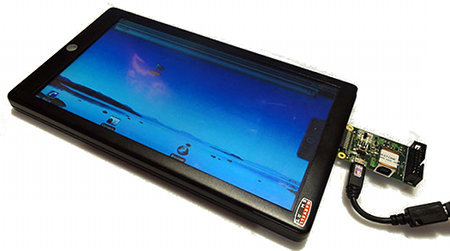Marvell promises $100 tablet for students
Mar 18, 2010 — by LinuxDevices Staff — from the LinuxDevices Archive — viewsMarvell announced its intent to deliver a $100, Android-ready tablet computer built around a 1GHz Armada 600 series processor. Aimed at students, the “Moby” will offer WiFi, Bluetooth, GPS, an FM receiver, and Adobe Flash compatibility, the company says.
Marvell's "bold new education initiative" was unveiled at this week's Future of Publishing conference in New York, but the company did not say whether it will manufacture the Moby itself or — as we think more likely — merely try to spur on third-party manufacturers by creating a reference design. In any case, the tablet, whose screen size was not mentioned, appears to offer functionality associated with devices including Apple's forthcoming iPad, but at a significantly lower price.
 Weili Dai (right), a Marvell co-founder who is also the VP and GM of its consumer and computing business unit, said in her Future of Publishing keynote, "Marvell can help propel education into the 21st century with an all-in-one device. With the Moby tablet, students can conduct primary research, reach out directly to the world's leading subject experts and even collaborate with one another around the globe. Best of all, the device is highly affordable."
Weili Dai (right), a Marvell co-founder who is also the VP and GM of its consumer and computing business unit, said in her Future of Publishing keynote, "Marvell can help propel education into the 21st century with an all-in-one device. With the Moby tablet, students can conduct primary research, reach out directly to the world's leading subject experts and even collaborate with one another around the globe. Best of all, the device is highly affordable."
If priced at just $100, the Moby will presumably feature conventional LCD technology, not an E Ink display. However, Marvell says downloadable textbooks for the Moby could sell for a fraction of bound versions, adding that the device should also help children from being injured by toting overweight backpacks.
According to Dai, Marvell will soon announce a pilot program in partnership with the District of Columbia Public School (DCPS) system, through which it donate a Moby tablet to every child in an at-risk school as part of a multi-year program in new media and learning. Details of this program will be announced at a future date, the company added.
Hardware details
As noted, Marvell didn't specify the screen size of the Moby, but the device's other hardware specifications are ambitious for a $100 device. It's said the tablet will offer WiFi, Bluetooth, an FM radio, and a GPS receiver, and will be capable of 1080p video encoding and decoding. Unlike Apple's iPad, the Moby will be compatible with "full Adobe Flash," and it will run Android or Windows Mobile on a "gigahertz-class" processor, the company adds.
Regarding the latter, Marvell said Moby will use an Armada 600 series processor, though it didn't say which. The Armada 610, announced last October, is based on an ARMv7 core, has a 1GHz clock sped, includes a display controller that offers resolutions up to 2000 x 2000 pixels, and has an integral 3D accelerator, according to the company.
A follow-up Armada 618 model was announced last month, though Marvell didn't do much to distinguish it from the existing 610. The company did say the 12 x 12mm Armada 618 is capable of supporting four simultaneous displays and 1080p video decode/encode, and also comes with a "highly robust security subsystem" including a secure execution processor. The 618's 3D graphics engine supports DirectX, Open GL ES 2.0, and Open VG 1.1, rendering up to 45 million triangles per second, the company added.

A 10.1-inch Android tablet reference design from Marvell
Source: Technologizer
According to a posting on the Technologizer blog by Harry McCracken, Marvell also used the Future of Publishing conference to show off at least one prototype device, the 10.1-inch, Android-based tablet pictured above. McCracken did not offer any further details, but we suspect this reference design is larger than what's being contemplated for the Moby.
Marvell stated it has "made a long-term commitment to supporting education at all levels." The company also says it is the "largest sponsor" of the One Laptop per Child program, which is providing (still x86-based) netbooks to third-world children.
A video demonstrating the Armada 610
Source: Marvell
(click to play)
Availability
Further information on Marvell's Armada 600 processors may be found on the company's website, here. Harry McCracken's Technologizer posting may be found here.
This article was originally published on LinuxDevices.com and has been donated to the open source community by QuinStreet Inc. Please visit LinuxToday.com for up-to-date news and articles about Linux and open source.